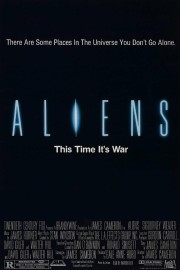Aliens
In the eyes of many, James Cameron’s “Aliens” improved upon a classic. Seeing it for the first time in 20 years, my opinion of it as a great, action-oriented follow-up to Ridley Scott’s more cerebral original film remains the same, although I would still put it slightly below Scott’s “Alien” in the grand scheme of things. Having said that, Cameron’s accomplishment is broadening the scope of the franchise in a riveting way, as well as establishing Ripley, Sigourney Weaver’s character, and the lone survivor of “Alien,” as an action hero to be reckoned with. That he had been commissioned to make this film before “The Terminator” made him a household name (he was writing this before he went off to make that film) is a point I didn’t realize, and makes Fox’s trust in him with this film all the more impressive.
The film begins exactly as “Alien” ended- with Ellen Ripley, and the cat, Jonesy, in cryogenic sleep after surviving the alien attack that decimated the crew of the Nostromo. In an escape pod, she took her chances in the dark of space that someone would find them. As this film opens, a scavenger crew has found them, but when she is encountered by Burke (Paul Reiser), a representative of the company her and her crew worked for, she is in for a rude awakening when she finds out that she has been asleep for 57 years. As she tells the story of her survival, and why she had to destroy the Nostromo, she finds very few people who believe her story, on account that no one has actually encountered the type of lifeform she is describing. One part of her story does perk their interest, and that is the planet her crew landed on, and found the alien species at. The reason is that the company is responsible for the terraforming project on that planet, where between 60-70 families preside, and the colony has not been heard from for several days. No one had reported any dangerous life on the planet, but the company is concerned, and they are sending a group of Marines to investigate, and want Ripley to act as a consultant, as she is the only one who has had contact with the alien. She reluctantly agrees, and soon, everyone will realize just why she was so reluctant.
One thing that occurred to me, that really should be an obvious thing about this series, is how deceptively closed off it actually is. In the first four films, Ripley is clearly the catalyst for the action, and interactions with this alien species, but even when you include Ridley Scott’s “Prometheus” in the mix, each movie really only is set on one location, which makes sense, but also makes how much each successive filmmaker (Scott, Cameron, David Fincher, Jean-Pierre Jeunet, then back to Scott) has expanded this franchise, and given us a glimpse of the world Ripley and these characters inhabit, all the more impressive. Compare this to the “Predator” films, which is fundamentally a similar riff on this formula, but didn’t really expand until 2010’s “Predators.” (I’m intentionally leaving out the two “Alien vs. Predator” movies on account of how poorly they serviced these franchises, and pillaged from what was good about them without really adding a lot.) We get a pretty vivid idea of the world the alien species, with its evolving forms, lives in, and it’s a big part of why, even when the films seemed to get worse, the franchise still has fans enough to keep going. Let’s focus, specifically, on what Cameron brings to the table. He is the first one to introduce the alien queen to the franchise, and the way he does so is one of the most thrilling sequences of the franchise, a prolonged sequence (about 15-20 minutes) wherein Ripley must go into the alien nest to rescue Newt (Carrie Henn, in her only film role), the lone survivor of the colony, from being impregnated with a facehugger. Which brings us to the second thing Cameron brings to “Aliens”- an evolution of the character of Ripley, largely through her maternal caring for Newt. She was already a kick ass woman in “Alien,” but Cameron- in what would be a pattern with him over the years- elevated Ripley to the pantheon of strong female characters in cinema, which she is still, very much, a part of. The character’s most iconic moment, where she says, “Stay away from her, you bitch,” to the alien queen has the weight and power it has because of the way the character had evolved, through her relationship with Newt, over the course of Cameron’s film. That dynamic alone takes “Aliens” to the level of the greatest action movies of all-time.
An interesting point of fact with the “Alien” franchise has been how flexible it is in terms of genre. “Alien” is a slow-burn horror film. “Alien 3” was a prison break film. “Alien Resurrection” was a bizarre blend of horror and dark comedy. And “Prometheus” is an epic exploration into the unknown. “Aliens,” with its group of Marines (including Michael Biehn, Bill Paxton and Jenette Goldstein, among others) is a full-on war film, albeit one focusing on one battle, which James Horner’s score emphasizes. But this isn’t an ordinary war film, because the military in this film feels at the service to a corporation looking to profit from disturbing places they shouldn’t. It’s a notion he later recycled for “Avatar,” but it works much better here because the characters are stronger, the story is tighter, and the stakes feel higher. Yes, we have a feeling Ripley will survive in the end, but none of what happens in “Aliens” feels manufactured for the purpose of keeping a franchise alive, but making sure Cameron tells a ripping, contained yarn within the universe he was presented. Thirty one years later, it’s still one of his best films, and a model at what sequels can accomplish.










